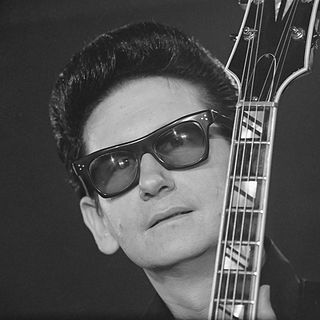
Roy Kelton Orbison was an American singer, songwriter, and guitarist known for his distinctive and powerful voice, complex song structures, and dark, emotional ballads. Orbison's music is mostly in the rock music genre and his most successful periods were in the early 1960s and the late 1980s. He was nicknamed "The Caruso of Rock" and "The Big O". Many of Orbison's songs conveyed vulnerability at a time when most male rock-and-roll performers projected machismo. He performed with minimal motion and in black clothes, matching his dyed black hair and dark sunglasses.
"I Drove All Night" is a song written and composed by American songwriters Billy Steinberg and Tom Kelly and originally intended for Roy Orbison. Orbison recorded the song in 1987, the year before his death, but his version was not released until 1992. Cyndi Lauper recorded the song and released it as a single for her A Night to Remember album. Her version became a top 10 hit on both sides of the Atlantic in 1989 and was also her final top 40 hit on the American pop charts. Lauper still regularly performs the song in her live concerts. The song has also been covered by Canadian singer Celine Dion, whose version topped the Canadian Singles Chart and reached number 7 on the US Adult Contemporary chart in 2003.
Roy Orbison and Friends: A Black and White Night is a 1988 Cinemax television special originally broadcast on January 3, 1988, presenting a performance by singer/songwriter Roy Orbison and the TCB Band with special guests including Bruce Springsteen, k.d. lang and others. The special was filmed entirely in black and white. After the broadcast, the concert was released on VHS and Laserdisc, and a live album was released in 1989.

Mystery Girl is the twenty-second album by American singer Roy Orbison. It was his last album to be recorded during his lifetime, as he completed the album in November 1988, a month before his death at the age of 52, and it was released posthumously by Virgin Records on January 31, 1989. It includes the hit singles "You Got It", which was co-written by Orbison and his Traveling Wilburys bandmates Jeff Lynne and Tom Petty, and "She's a Mystery to Me", written by Bono and The Edge. The album was a critical and commercial success; it peaked at number 5 on the Billboard 200 in the United States, the highest position Orbison had achieved on that chart, and number 2 on the UK Albums Chart.

Early Orbison is an album recorded by Roy Orbison on the Monument Records label at the RCA Studio B in Nashville, Tennessee, and released in 1964. Essentially a compilation of songs from his first two Monument albums, it is most noteworthy for containing "Pretty One", the "B" side of Orbison's second Monument single, "Uptown". Many Orbison fans believe "Pretty One" would have been his first major hit had it been promoted as an "A" side. The second song of interest on this album is "Come Back to Me My Love" which Fred Foster, owner of Monument Records and producer of all of Orbison's earliest hits, says was the song which inspired production of the hit arrangement that later became "Only the Lonely".

Orbisongs is a compilation LP released by Monument Records in 1965 after Roy Orbison had left the label and joined MGM. It features tracks such as the stereo version of "Oh, Pretty Woman", a different version of "Dance", and the unreleased "I Get So Sentimental."

There Is Only One Roy Orbison is the seventh album recorded by Roy Orbison, and his first for MGM Records, released in July 1965. It features his studio recording of "Claudette", an Orbison-penned song which had become a hit for The Everly Brothers in 1958. Ironically, at the time he recorded the song in 1965, he had divorced his wife Claudette, who had inspired the lyrics. Orbison later re-recorded the song for In Dreams: The Greatest Hits in 1985. The single taken from the album was "Ride Away", which reached no. 25 in the US charts, no. 12 in Australia and no. 34 in the UK. Cash Box described "Ride Away" as a "rhythmic teen-angled ode about a somewhat ego-oriented lad who cuts-out on romance."
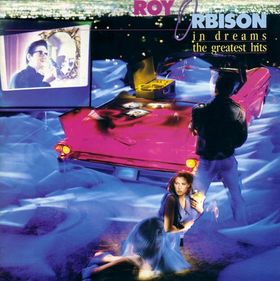
In Dreams: The Greatest Hits is a two-record album set by Roy Orbison songs released in 1987 on Virgin Records. It was produced by Orbison and Mike Utley, except for the song "In Dreams", produced by Orbison with T-Bone Burnett and film director David Lynch. All songs are re-recordings by Orbison from 1986, except "In Dreams" from April 1987.

"Blue Bayou" is a song written by Roy Orbison and Joe Melson. It was originally sung and recorded by Orbison, who had an international hit with his version in 1963. It later became Linda Ronstadt's signature song, with which she scored a Top 5 hit with her cover in 1977. Many others have since recorded the song.
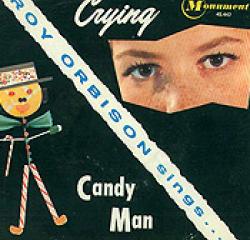
"Crying" is a song written by Roy Orbison and Joe Melson for Orbison's third studio album of the same name (1962). Released in 1961, it was a number 2 hit in the US for Orbison and was covered in 1978 by Don McLean, whose version went to number 1 in the UK in 1980.

"Only the Lonely (Know the Way I Feel)" is a 1960 song written by Roy Orbison and Joe Melson. Orbison's recording of the song, produced by Fred Foster for Monument Records, was the first major hit for the singer. It was described by The New York Times as expressing "a clenched, driven urgency". Released as a 45 rpm single by Monument Records in May 1960, "Only the Lonely" went to No. 2 on the United States Billboard pop music charts on 25 July 1960 (blocked by Brenda Lee's "I'm Sorry") and No. 14 on the Billboard R&B charts. "Only the Lonely" reached number one in the United Kingdom, a position it achieved on 20 October 1960, staying there for two weeks (out of a total of 24 weeks spent on the UK singles chart from 28 July 1960). According to The Authorized Roy Orbison, "Only the Lonely" was the longest charting single of Orbison's career. Personnel on the original recording included Orbison's drummer Larry Parks, plus Nashville A-Team regulars Floyd Cramer on piano, Bob Moore on bass, and Hank Garland and Harold Bradley on guitars, Joe Melson and the Anita Kerr Singers on backing vocals. Drummer Buddy Harman played on the rest of the songs on the session.

"In Dreams" is a song composed and sung by singer Roy Orbison. An operatic rock ballad of lost love, it was released as a single on Monument Records in February 1963. It became the title track of the album In Dreams, released in July of the same year. The song has a unique through-composed structure in seven movements in which Orbison sings through two octaves, beyond the range of most rock singers.
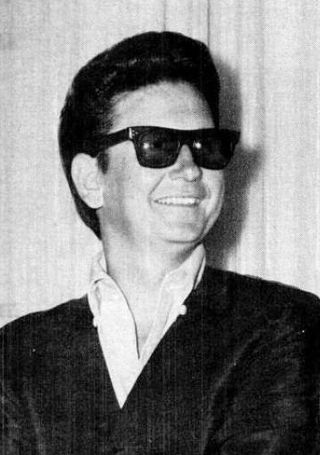
Roy Orbison was an American singer-songwriter who found the most success in the early rock and roll era from 1956 to 1964. He later enjoyed a resurgence in the late 1980s with chart success as a member of the Traveling Wilburys and with his Mystery Girl album, which included the posthumous hit single "You Got It". At the height of his popularity, 22 of Orbison's songs placed on the US Billboard Top 40 chart, and six peaked in the top five, including two number-one hits. In the UK, Orbison scored ten top-10 hits between 1960 and 1966, including three number-one singles.

"You Got It" is a song from American singer Roy Orbison's 22nd studio album, Mystery Girl (1989). The song was released posthumously on January 3, 1989, after Orbison's death from a heart attack on December 6, 1988. The song was issued with "The Only One" as the B-side and was later released with "Crying". The single reached number nine on the US Billboard Hot 100 and number one on the Adult Contemporary chart, returning Orbison to the top 10 for the first time in 25 years. "You Got It" also reached number three on the UK Singles Chart and entered the top five in 10 other countries. Although it is an Orbison solo single, Orbison's fellow Traveling Wilburys bandmates Tom Petty and Jeff Lynne co-wrote the song and played instruments on the record.

"Oh, Pretty Woman", or simply "Pretty Woman", is a song recorded by Roy Orbison and written by Orbison and Bill Dees. It was released as a single in August 1964 on Monument Records and spent three weeks at number one on the Billboard Hot 100 from September 26, 1964, making it the second and final single by Orbison to reach number one in the United States. It was also Orbison's third single to top the UK Singles Chart, where it spent three weeks at number one.

"She's a Mystery to Me" is a song by Roy Orbison, written by Bono and the Edge of U2. It was released on Orbison's final (posthumous) album, Mystery Girl, and as the album's second single in March 1989. The song was received favorably by several music critics and is considered one of the highlights of the album.
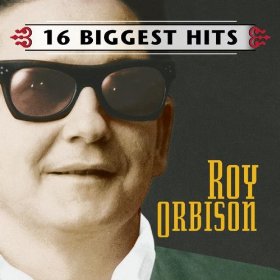
16 Biggest Hits is a 1999 Roy Orbison compilation album. It is part of a series of similar 16 Biggest Hits albums released by Legacy Recordings.
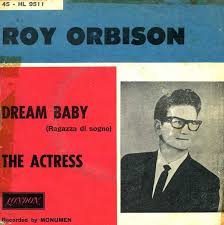
"Dream Baby (How Long Must I Dream)" is a song written by Cindy Walker which was first recorded and released by Roy Orbison originally as a non-album single in 1962. It was a big international hit for Orbison, reaching number 2 in both the Australian and the UK singles charts and number 4 in the U.S. Billboard. It was also a top ten hit in Canada and Norway. Five months later, "Dream Baby" was included on Orbison's Greatest Hits compilation LP.
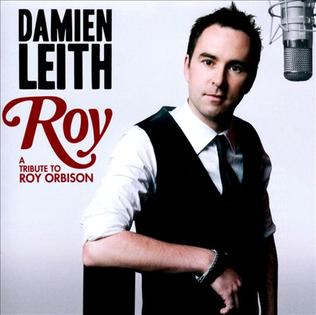
Roy: A Tribute to Roy Orbison is the fourth studio album by Damien Leith. It was released by Sony BMG in Australia on 15 April 2011 to coincide with Roy Orbison's 75th birthday.

A Love So Beautiful is a compilation album by American singer Roy Orbison. It was released on November 3, 2017 by Roy's Boys, Monument, Legacy, Sony. The album features archival vocal recordings of Orbison accompanied by new orchestral arrangements by the Royal Philharmonic Orchestra. It also features a duet with English country duo Ward Thomas.


















